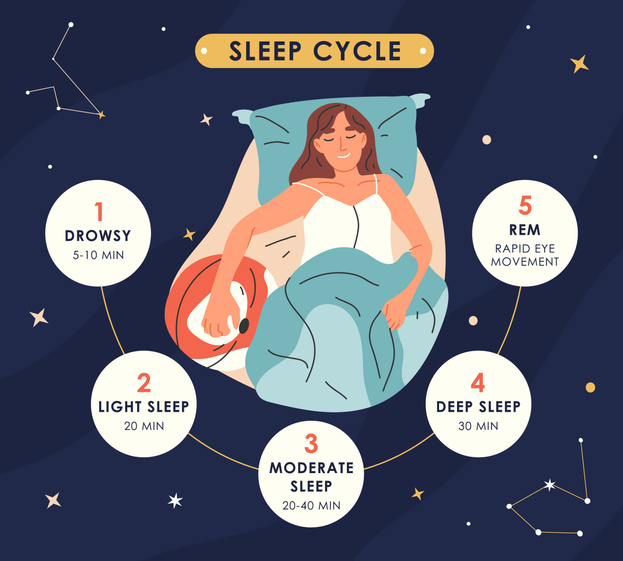
Sleep Isn’t Silence—It’s a Symphony.
The Orchestration of Sleep
Sleep isn't a uniform state where your brain simply takes a break. Instead, it's a dynamic process where your brain cycles through different stages, each serving unique and vital functions for your physical and mental well-being.
Understanding Your Nightly Journey Through Sleep Stages 🌙
Ever wondered what happens when you close your eyes at night? You're not simply "powering down" like a computer—you're embarking on a fascinating neurological adventure that unfolds in distinct movements, much like a musical symphony.
Think of sleep as nature's most sophisticated restoration program—a carefully choreographed dance between different brain states that keeps your mind sharp, your body energized, and your emotions balanced.
Sleep is divided into two main types:
✅ Non-Rapid Eye Movement (NREM) sleep
✅Rapid Eye Movement (REM) sleep
Together, these form a sleep cycle (sleep cycle calculator) that repeats about 4-6 times per night, with each cycle lasting 90-120 minutes.
Early cycles have more deep sleep (NREM Stage 3), while later cycles feature longer REM stages.
Maintaining these cycles is crucial for both physical restoration and mental health.
Drowsiness Stage 0 (5-10 minutes)
Drowsiness is that heavy, foggy sensation that descends when your body craves sleep but you're still awake. It's characterized by drooping eyelids, slowed thinking, reduced reaction times, and an overwhelming urge to close your eyes. This state occurs when your brain's sleep-promoting chemicals like adenosine build up throughout your day, or when your circadian rhythm signals it's time to rest.
Stage One: Light Sleep (N1) – The Gentle Transition 💫
The first movement of your nightly symphony begins with N1 sleep—that delicate threshold between wakefulness and slumber.
During this brief 5–10 minute period:
- Your breathing slows
- Muscles begin to relax
- Brainwaves shift from beta to alpha and theta
- You might experience hypnagogic hallucinations or sudden muscle jerks😵
🗣️ This is why you might say, "I wasn't sleeping!"—because awareness hasn’t fully let go yet.
🎶 Stage Two: Settling In (N2) – Finding the Rhythm 📊
As you drift deeper, your brain begins producing sleep spindles—short bursts of activity that help consolidate learning and memory. (10-25 minutes)
Physiological changes include:
- Slower heart rate
- Lower body temperature
- Reduced awareness of your surroundings
Key Insight: N2 sleep accounts for nearly 50% of your total sleep and helps protect you from waking up due to external noise or movement. Those spindles are your brain’s noise-cancelling headphones!
🔧 Stage Three: Deep Sleep (N3) – The Restorative Power 🔄
This is the most rejuvenating stage of sleep—the slow-wave, delta wave-rich stage. (20-40 minutes)
What your body does during N3:
- Releases growth hormone for tissue repair
- Boosts immune function
- Flushes out brain waste via the glymphatic system
- Organizes and consolidates long-term memories
Wake someone during this stage and they’ll be groggy—because their brain was in full restoration mode.
The Grand Finale: REM Sleep – Dreams Take Center Stage
Roughly 90 minutes in, your brain enters the vivid world of REM (Rapid Eye Movement) sleep.
What happens during REM:
- Eyes move rapidly beneath closed lids
- Breathing becomes irregular
- Brain activates as much as it does when awake
- Large muscle groups become paralyzed (to prevent acting out dreams)
- You experience powerful, emotional, story-rich dreams
💡 REM is believed to support emotional regulation, problem-solving, and motor skill learning (like playing piano or riding a bike) 🎹🚴
You’ll cycle through all these stages 4–6 times per night, each cycle about 90 minutes long.
Pattern of cycles:
- Early sleep: more deep (N3) sleep
- Later sleep: longer REM stages
Later sleep: longer REM stages That’s why the first part of your night repairs the body, and the second half restores the mind.
Knowing this helps you optimize sleep quality, not just quantity:
✅ Feeling groggy despite 8 hours? You may lack deep or REM sleep
✅ 20–30 minute power naps keep you in light sleep—no grogginess!
✅ Alcohol suppresses REM—hello, unrestful sleep after a few drinks
✅ Sleep trackers use heart rate and motion to estimate these stages
🎵 The Symphony’s Perfect Performance
When your sleep stages flow in harmony, you wake up refreshed, focused, and emotionally balanced. But if stress, screens, irregular routines, or medications disrupt this sequence, the music gets offbeat.
So the next time you drift off, remember—your brain isn’t shutting down; it’s tuning up every system in your body in a masterful, life-sustaining performance.
Sweet dreams, maestro. 😴✨
📢 Takeaway: Small, intentional changes add up over time, leading to better, more restful sleep!